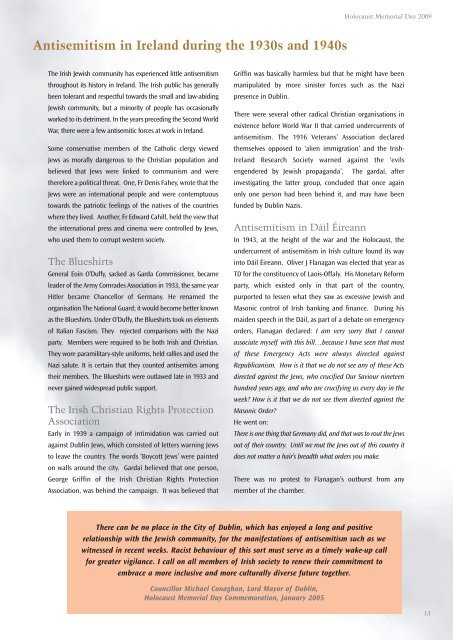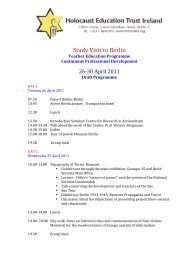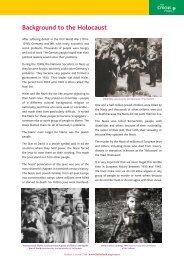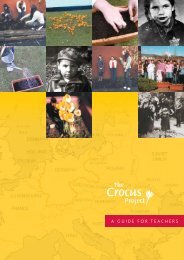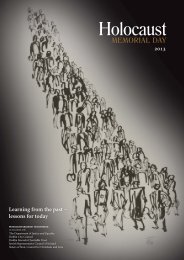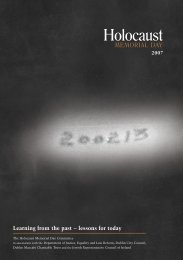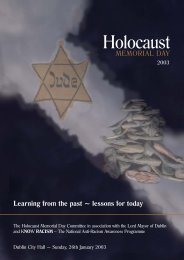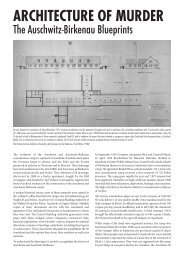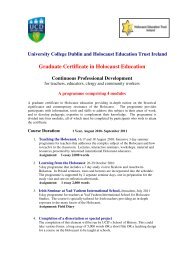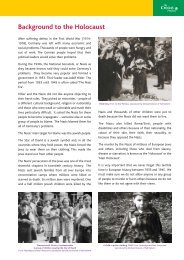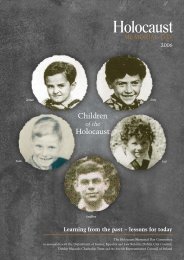Learning from the past ~ lessons for today - Holocaust Education ...
Learning from the past ~ lessons for today - Holocaust Education ...
Learning from the past ~ lessons for today - Holocaust Education ...
You also want an ePaper? Increase the reach of your titles
YUMPU automatically turns print PDFs into web optimized ePapers that Google loves.
<strong>Holocaust</strong> Memorial Day 2009<br />
Antisemitism in Ireland during <strong>the</strong> 1930s and 1940s<br />
The Irish Jewish community has experienced little antisemitism<br />
throughout its history in Ireland. The Irish public has generally<br />
been tolerant and respectful towards <strong>the</strong> small and law-abiding<br />
Jewish community, but a minority of people has occasionally<br />
worked to its detriment. In <strong>the</strong> years preceding <strong>the</strong> Second World<br />
War, <strong>the</strong>re were a few antisemitic <strong>for</strong>ces at work in Ireland.<br />
Some conservative members of <strong>the</strong> Catholic clergy viewed<br />
Jews as morally dangerous to <strong>the</strong> Christian population and<br />
believed that Jews were linked to communism and were<br />
<strong>the</strong>re<strong>for</strong>e a political threat. One, Fr Denis Fahey, wrote that <strong>the</strong><br />
Jews were an international people and were contemptuous<br />
towards <strong>the</strong> patriotic feelings of <strong>the</strong> natives of <strong>the</strong> countries<br />
where <strong>the</strong>y lived. Ano<strong>the</strong>r, Fr Edward Cahill, held <strong>the</strong> view that<br />
<strong>the</strong> international press and cinema were controlled by Jews,<br />
who used <strong>the</strong>m to corrupt western society.<br />
The Blueshirts<br />
General Eoin O’Duffy, sacked as Garda Commissioner, became<br />
leader of <strong>the</strong> Army Comrades Association in 1933, <strong>the</strong> same year<br />
Hitler became Chancellor of Germany. He renamed <strong>the</strong><br />
organisation The National Guard; it would become better known<br />
as <strong>the</strong> Blueshirts. Under O’Duffy, <strong>the</strong> Blueshirts took on elements<br />
of Italian Fascism. They rejected comparisons with <strong>the</strong> Nazi<br />
party. Members were required to be both Irish and Christian.<br />
They wore paramilitary-style uni<strong>for</strong>ms, held rallies and used <strong>the</strong><br />
Nazi salute. It is certain that <strong>the</strong>y counted antisemites among<br />
<strong>the</strong>ir members. The Blueshirts were outlawed late in 1933 and<br />
never gained widespread public support.<br />
The Irish Christian Rights Protection<br />
Association<br />
Early in 1939 a campaign of intimidation was carried out<br />
against Dublin Jews, which consisted of letters warning Jews<br />
to leave <strong>the</strong> country. The words ‘Boycott Jews’ were painted<br />
on walls around <strong>the</strong> city. Gardaí believed that one person,<br />
George Griffin of <strong>the</strong> Irish Christian Rights Protection<br />
Association, was behind <strong>the</strong> campaign. It was believed that<br />
Griffin was basically harmless but that he might have been<br />
manipulated by more sinister <strong>for</strong>ces such as <strong>the</strong> Nazi<br />
presence in Dublin.<br />
There were several o<strong>the</strong>r radical Christian organisations in<br />
existence be<strong>for</strong>e World War II that carried undercurrents of<br />
antisemitism. The 1916 Veterans’ Association declared<br />
<strong>the</strong>mselves opposed to ‘alien immigration’ and <strong>the</strong> Irish-<br />
Ireland Research Society warned against <strong>the</strong> ‘evils<br />
engendered by Jewish propaganda’. The gardaí, after<br />
investigating <strong>the</strong> latter group, concluded that once again<br />
only one person had been behind it, and may have been<br />
funded by Dublin Nazis.<br />
Antisemitism in Dáil Éireann<br />
In 1943, at <strong>the</strong> height of <strong>the</strong> war and <strong>the</strong> <strong>Holocaust</strong>, <strong>the</strong><br />
undercurrent of antisemitism in Irish culture found its way<br />
into Dáil Éireann. Oliver J Flanagan was elected that year as<br />
TD <strong>for</strong> <strong>the</strong> constituency of Laois-Offaly. His Monetary Re<strong>for</strong>m<br />
party, which existed only in that part of <strong>the</strong> country,<br />
purported to lessen what <strong>the</strong>y saw as excessive Jewish and<br />
Masonic control of Irish banking and finance. During his<br />
maiden speech in <strong>the</strong> Dáil, as part of a debate on emergency<br />
orders, Flanagan declared: I am very sorry that I cannot<br />
associate myself with this bill…because I have seen that most<br />
of <strong>the</strong>se Emergency Acts were always directed against<br />
Republicanism. How is it that we do not see any of <strong>the</strong>se Acts<br />
directed against <strong>the</strong> Jews, who crucified Our Saviour nineteen<br />
hundred years ago, and who are crucifying us every day in <strong>the</strong><br />
week? How is it that we do not see <strong>the</strong>m directed against <strong>the</strong><br />
Masonic Order?<br />
He went on:<br />
There is one thing that Germany did, and that was to rout <strong>the</strong> Jews<br />
out of <strong>the</strong>ir country. Until we rout <strong>the</strong> Jews out of this country it<br />
does not matter a hair’s breadth what orders you make.<br />
There was no protest to Flanagan’s outburst <strong>from</strong> any<br />
member of <strong>the</strong> chamber.<br />
There can be no place in <strong>the</strong> City of Dublin, which has enjoyed a long and positive<br />
relationship with <strong>the</strong> Jewish community, <strong>for</strong> <strong>the</strong> manifestations of antisemitism such as we<br />
witnessed in recent weeks. Racist behaviour of this sort must serve as a timely wake-up call<br />
<strong>for</strong> greater vigilance. I call on all members of Irish society to renew <strong>the</strong>ir commitment to<br />
embrace a more inclusive and more culturally diverse future toge<strong>the</strong>r.<br />
Councillor Michael Conaghan, Lord Mayor of Dublin,<br />
<strong>Holocaust</strong> Memorial Day Commemoration, January 2005<br />
13


